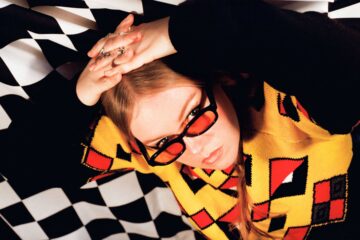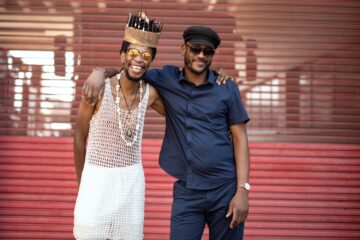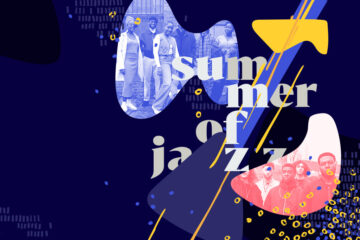»Let me just put on a T-shirt«, says a robust voice in the Zoom call, »then I can switch on my video«. We hear a rustling sound. Three seconds later he appears: Bokani Dyer, pianist, native of Botswana and leader of his own jazz trio in Johannesburg. The 37-year-old musician grins upwards into the mobile phone camera. His face is framed by a beard that has been allowed to grow ever since Dyer arrived in New York about a month ago. It was the first time since the beginning of the pandemic that he had been in this »crazy city«, playing a few gigs, taking a little holiday. Soon he will be heading back to South Africa, his home. Five hours after his arrival, his first album will be released on Brownswood, Gilles Peterson’s label.

Radio Sechaba
»Radio Sechaba«, the title of the record, advocates for the empowerment of individuals, claims Bokani. This can be deduced directly from the title. »Sechaba« is taken from Setswana, the official language of Botswana, and means »nation«. »For me, a nation consists of individuals. When you say Radio Sechaba, it’s like turning on a radio station committed to nation-building.« Eventually, he says, South Africa today is confronted with problems stemming from its unresolved past. »On paper, it looks like apartheid ended in 1994 when the country held its first democratic elections,« he says. »But that is not true.«
The fact that his music sounds like an update of Bubblegum, the happy music from the apartheid years in South Africa, is no contradiction for Bokani. He quotes Nina Simone and Wayne Shorter, who is reported to have said that you have to play the way you want the world to be.
»Music can serve as an escape from your personal problems. But it’s not all about having a good time. I do address some pretty serious topics in my lyrics. But the way I go about it is to wrap them up in good vibes. With my art, I want to make a contribution to the social discussion about the problems of the present day.«
Rotten tangerines and piano lessons with the self-taught
Bokani was born in 1986 in Gaborone, the capital city of Botswana. His father is the jazz saxophonist Steve Dyer. In 1993, he moved to Johannesburg with his father. The first democratic elections are held in South Africa a few months later. »I remember my father coming back from the election. The authorities sprayed ink on people’s fingers to show they had already voted. The ink smelled like rotten tangerines.«
Although his father is a well-known musician in South Africa, Bokani takes up playing the piano somewhat late. His father wasn’t against him learning an instrument, but he didn’t push him either, explains Bokani. At the age of twelve he took a few flute lessons. He then moved back to live with his mother in Gaborone to go to high school. There, he had made friends with a classmate who liked to mess around on the instruments in the rehearsal room.
»I do address some pretty serious topics in my lyrics. But the way I go about it is to wrap them up in good vibes«
Bokani Dyer
»He was self-taught, and that intrigued me, so we played together. Sometimes, when he wasn’t around, I had to figure out for myself what I wanted to play. That was the moment I started composing my own music.«
In the mid-2000s, Bokani enrolled in the jazz studies course at the South African College of Music at the University of Cape Town. He graduates in 2008, wins some awards, sails with his jazz house group Soul Housing Project to the Lighthouse Festival in Croatia, releases album after album, tours Switzerland, the UK and Germany, wins more awards, enrols for his Master’s degree, and graduates with a thesis on political themes in the music of his generation of musicians.
The fact that Bokani Dyer ends up on the label from the all-knowing Peterson with his new album has a backstory with many connections. »It was Shabaka Hutchings’ link to Siya Mthembu from the performance troupe The Brother Moves On that did it. Gilles Peterson became interested in the South African jazz scene because Siya is also a member of Shabaka’s Ancestors, who released on Brownswood. Finally, Siya had the chance to contribute to a compilation on Brownswood. He asked me to contribute a track. Which I did. When I finished my album, I called London again. That’s how it happened.«









